Related Research Articles
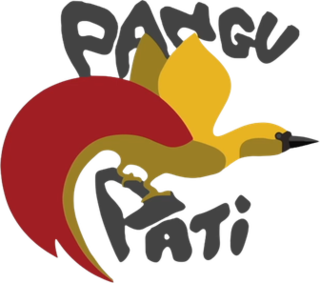
The Pangu Pati,officially Papua na Niugini Yunion Pati,is a nationalist and developmentalist political party on the centre-left in Papua New Guinea. The party is the oldest political party in Papua New Guinea and has held all levels of government throughout its history. As of 2023,it is the largest party in the National Parliament.

General elections were held in Papua New Guinea between 18 June and 9 July 1977,the first since independence from Australia in 1975. The Pangu Party led by Prime Minister Michael Somare emerged as the largest in the National Parliament. Somare subsequently formed a coalition government with the People's Progress Party (PPP) and several independent MPs. Voter turnout was 60.3%.

General elections were held in Papua New Guinea between 13 June and 4 July 1987. The Pangu Party emerged as the largest party,winning 26 of the 109 seats. Voter turnout was 73.5%.

John Momis is a Bougainvillean politician who served as the President of the Autonomous Region of Bougainville in Papua New Guinea between 2010 and 2020.
Iambakey Palma Okuk was an independence leader in Papua New Guinea and served as Deputy Prime Minister,the nation's first Minister for Agriculture and Fisheries,and repeatedly in the capacity of Minister of Transport,Minister of Primary Industries and Leader of the Opposition. He is known as Papua New Guinea's "most colourful and controversial politician". Okuk first led protests against unfair labor practices,and then once elected to office,worked to reserve sectors of the economy for citizens as a method of returning a complex economic role to Papua New Guineans. In the post-independence decade,Okuk built a coalition of minority political factions which forced a successful change of government,in which he became Deputy Prime Minister.
Grand Chief Brigadier Edward Ramu (Ted) Diro,GCL,CBE is a Papua New Guinean politician and soldier.
Members were initially elected to the colonial House of Assembly of Papua and New Guinea at the 1972 election. Papua New Guinea gained independence on 16 September 1975,midway through the five-year term. At independence,the body was renamed to the National Parliament of Papua New Guinea and members continued in office to serve out the remainder of their terms.
Waliyato Clowes is a Papua New Guinean politician. She was a member of the National Parliament of Papua New Guinea from 1977 to 1982,representing the Middle Fly Open electorate in Western Province.

General elections were held in the Territory of Papua and New Guinea between 19 February and 11 March 1972. They saw the election of the country's first female MP,Josephine Abaijah.

Matthias Tutanava Toliman was a Papua New Guinean politician. He served as a member of the House of Assembly between 1964 and 1973,also holding ministerial roles from 1964 until 1972.

Paulus Arek was a Papua New Guinean politician and trade unionist. He served as a member of the House of Assembly between 1968 and 1973,and as Minister for Information from 1972 to 1973.
Oala Oala-Rarua was a Papua New Guinean educator,civil servant,trade unionist,politician and diplomat. He served as a member of the House of Assembly and Assistant Minister for the Treasury between 1968 and 1972,later becoming the first Lord Mayor of Port Moresby and High Commissioner to Australia.
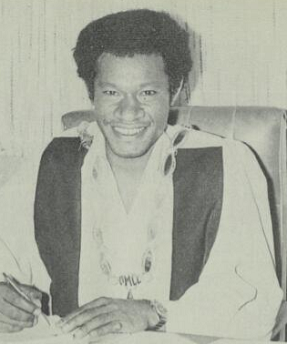
Sevese Oipi Morea was a Papua New Guinean radio broadcaster,businessman and politician. He served as a member of the National Parliament from 1977 to 1982,and as Speaker from 1980 until 1982.

Ronald Thomas Dalton Neville was an Australia-born Papua New Guinean politician and businessman. He served as a member of the House of Assembly and National Parliament from 1964 to 1977.

Turi Wari was a Papua New Guinean politician. He served as a member of the House of Assembly and National Parliament from 1968 until 1977.
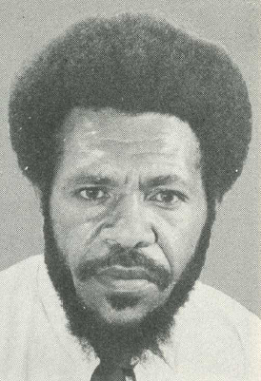
Buaki Singeri was a Papua New Guinean politician. He served as a member of the House of Assembly and National Parliament from 1972 until 1977.

Henry Charles Humphreys was an English-born Papua New Guinean politician. He served as a member of the National Parliament in two spells between 1972 and his death.
Talu Bolt was a Papua New Guinean politician. He served as a member of the National Parliament from 1977 to 1982.
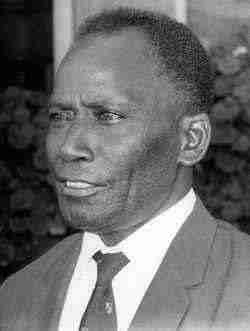
Sir Paul Lapun was a Papua New Guinean politician. Both a supporter of independence for Papua New Guinea (PNG) and of the secessionist movement on Bougainville,Lapun served in the House of Assembly of Papua and New Guinea and in the first National Parliament of Papua New Guinea between 1972 and 1975,when he was Minister for Mines and Energy. He was instrumental in obtaining royalties for the people of Bougainville for the copper mine on their island. He was the first Papua New Guinean to receive a knighthood.
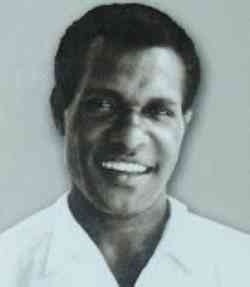
Sir Ebia Olewale (1940–2009) was a politician in Papua New Guinea (PNG). He was elected as a member of the House of Assembly of Papua and New Guinea in 1968 and went on to hold several ministerial positions during the period of self-governance and after PNG's independence in 1975,including that of deputy prime minister. He was knighted in 1983 and served as chancellor of the University of Goroka from 2000 to 2006. From 2002 until his death,he was a director of the Papua New Guinea Sustainable Development Program.
References
- 1 2 Peter King (1989) Pangu Returns to Power: The 1982 Elections in Papua New Guinea p151
- ↑ "Twisted" clergymen in Papua Pacific Islands Monthly, March 1975
- ↑ Papua New Guinea Election Results 1972 – 2012 Development Policy Centre
- ↑ Elections in Papua New Guinea Australian Foreign Affairs Record, August 1977, p410
- 1 2 Posu Ank Pacific Islands Monthly, July 1982
- ↑ Posu Ank Memorial Primary School Department of Education